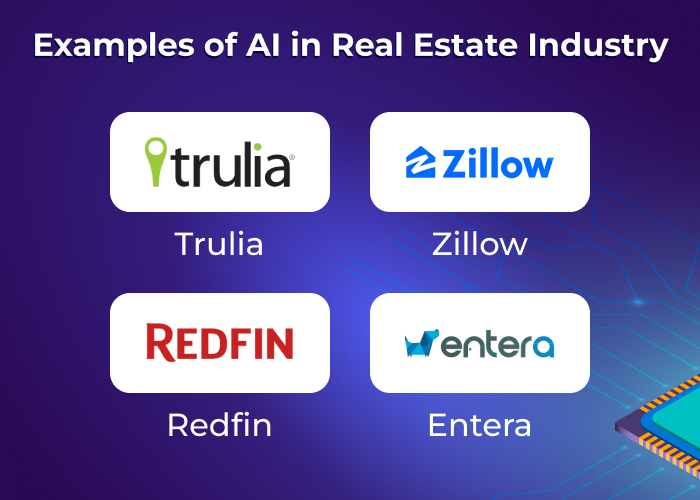Use Cases of AI in real estate
Property Valuation
AI algorithms analyze vast amounts of data including market trends, property features, location, and comparable sales to accurately estimate property values. This aids customers in making wise judgments and sellers in setting competitive rates.
Virtual Property Tour
Using virtual reality (VR) and augmented reality (AR) technologies, AI in real estate can create experiences without the need for physical visits. Potential buyers can explore properties remotely, saving time and resources for both buyers and sellers.
Customer Service Chatbots
AI-powered chatbots provide instant responses to customer inquiries, schedule property viewings, and provide information about listings, thereby enhancing customer service and engagement. These chatbots can handle repetitive tasks, freeing up human agents to focus on more complex queries.
Property Management
Property managers can anticipate maintenance needs, maximize rental rates, and spot possible problems like late payments or vacancies with the use of artificial intelligence. Automated systems can optimize rental income, enhance tenant happiness, and expedite administrative processes.
Lead Generation
AI algorithms examine consumer behavior, tastes, and demographics to find possible leads and tailor advertising campaigns. This focused strategy yields higher-quality leads and improves the efficacy of marketing initiatives.
Fraud Detection
Furthermore, AI systems evaluate credit reports, financial data, and property details to determine how risky mortgage applications and rental contracts are. Moreover, AI lessens financial losses for both buyers and sellers by assisting in the detection of illegal activities like identity theft and property fraud.
Smart Home Technology
Smart home appliances with AI capabilities improve convenience, security, and energy efficiency for homeowners. These gadgets may automate functions like lighting, security monitoring, and temperature management, enhancing both the living space and the total value of the home.
Market Analysis
Real-time market data analysis is done by AI platforms to reveal information about market trends, property performance, and investment prospects. This supports investors in optimizing their investment portfolios for optimum returns and making data-driven decisions.
Examples of AI in real estate industry

To get a deeper understanding, let’s go through the real-life use cases of AI in real estate industry.
- Trulia: Headquartered in San Francisco, Trulia uses AI for personalized suggestions in real estate and to improve customer experience. Thus, this AI-powered app for real estate tailors property suggestions based on user activity, search history, and given preferences.
- Zillow: Zillow, a well-known real estate company, uses artificial intelligence to scan digital pictures and other pertinent parameters and provide free property value estimates. Thus, this approach uses a neural network trained on large datasets including millions of images and their related house values. It reads photographs from fresh property postings to extract useful information.
- Redfin: It is using AI in real estate, data science, and other technologies to improve decision-making and produce better results. Furthermore, the firm collaborates with mixed landlords to provide service models such as lease-to-own.
- Entera: It is a real estate investing platform. Entera uses AI for predictive analytics based on market data and provides ideation to users. Thus, AI helps in making important decisions for buying property understanding the demand and requirements. Its headquarters is in New York & platform manages over 1,000 monthly transactions.
Conclusion
In summary, AI in real estate is transforming the real estate sector by providing cutting-edge solutions that boost productivity, sharpen judgment, and improve client experiences.
AI is changing the way that real estate agents, investors, and customers engage with the market. Examples of this include chatbots for customer support, virtual property tours, and property assessments.
Instances from businesses like Entera, Zillow, Redfin, and Trulia demonstrate the usefulness of AI in a variety of real estate-related contexts. AI’s contribution to the real estate business will only grow as it develops, opening the door for a more intelligent and dynamic sector.
FAQs
How does AI impact property valuation accuracy?
Can AI-powered virtual assistants personalize property suggestions for buyers?
What role does AI play in detecting and preventing fraudulent activities in real estate transactions?
How do AI algorithms optimize rental income for property managers?
What are the advantages of using AI in market analysis for real estate investment decisions?
Ravi Bhojani is the Chief Marketing Officer (CMO) at Alian Software, where he spearheads the company’s marketing strategies and drives its brand presence in the competitive IT services landscape. With over a decade of experience in the technology and marketing sectors, Ravi has consistently demonstrated his ability to blend innovative marketing techniques with deep industry knowledge to deliver outstanding results.